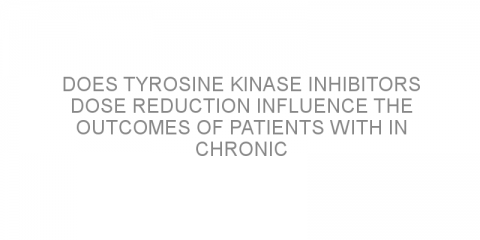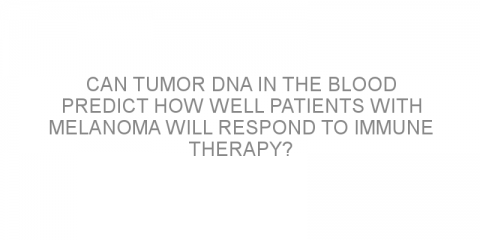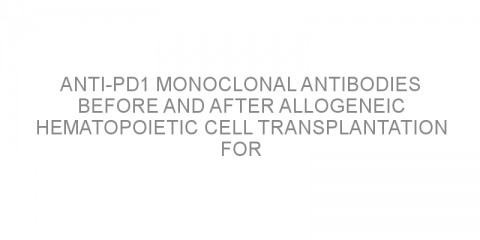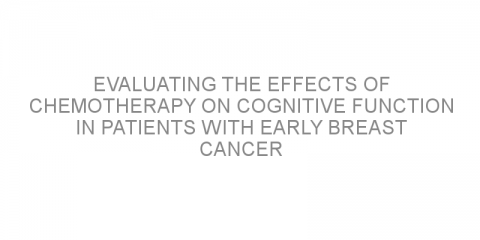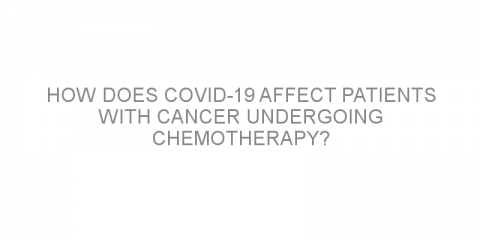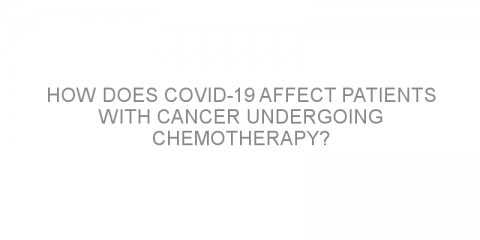In a nutshell The review aimed to develop recommendations for stopping tyrosine kinase inhibitor (TKI) therapy in patients with chronic myeloid leukemia CML. Some background Tyrosine kinase inhibitors (TKI) are a type of targeted therapy. TKIs have improved the survival outcomes for patients with chronic myeloid...
Read MoreCurrent treatment status-Undergoing active treatment Posts on Medivizor
Real-world clinical outcomes for patients with chronic myeloid leukemia who needed to switch from second generation TKI therapy.
In a nutshell This study described real-world outcomes for patients with chronic myeloid leukemia (CML) that started a second-generation tyrosine kinase inhibitor (TKI) therapy and needed to switch to an alternative TKI. The authors concluded that intolerance was the major reason to switch to an alternative TKI and that outcomes were very good...
Read MoreEvaluating dual-target CAR T-cell therapy for patients with unresponsive B-cell NHL
In a nutshell This study evaluated the safety and effectiveness of dual chimeric antigen receptor (CAR) T-cell therapy for patients with recurrent or hard-to-treat B-cell non-Hodgkin lymphoma (NHL). This study found that this treatment was safe and effective for these patients. Some background B-cell non-Hodgkin’s lymphoma (NHL) is one of...
Read MoreDoes tyrosine kinase inhibitors dose reduction influence the outcomes of patients with in chronic myeloid leukemia?
In a nutshell This study aimed to investigate the effect of tyrosine kinase inhibitor (TKI) dose reduction in patients with chronic myeloid leukemia (CML) after achieving a major molecular response (MMR). This study concluded that the TKI dose reduction was safe and effective for the majority of these...
Read MoreEvaluating cachexia after first-line treatment for patients with colorectal cancer
In a nutshell This study investigated the occurrence of cachexia (CX; weight loss and muscle wasting) in patients with advanced colorectal cancer after first-line therapy. Researchers suggested that CX is present in half of these patients within 24 weeks after starting first-line therapy. Some background Colorectal cancer is the third most common...
Read MoreCan tumor DNA in the blood predict how well patients with melanoma will respond to immune therapy?
In a nutshell This study looked at the role of circulating tumor DNA (ctDNA) in predicting treatment response in advanced melanoma. They found that in patients treated for the first time with immune treatment, patients with low ctDNA levels had a longer survival without cancer worsening. Some background Advanced melanoma describes melanoma...
Read MoreAnti-PD1 monoclonal antibodies before and after allogeneic hematopoietic cell transplantation for relapsed or refractory Hodgkin lymphoma
In a nutshell The study evaluated outcomes of anti-programmed cell death-1 monoclonal antibodies (anti-PD-1-mAbs or APMs) before and after allogeneic hematopoietic cell transplantation (alloHCT) for patients with relapsed/refractory Hodgkin lymphoma (r/r-HL). The authors found that patients receiving APMs before alloHCT had frequent immune-related...
Read MoreBenefits of autologous hematopoietic stem cell transplantation after checkpoint inhibitor therapy in patients with relapsed/refractory Hodgkin lymphoma
In a nutshell The study evaluated real-life benefits of autologous hematopoietic stem cell transplantation (ASCT) after immune checkpoint inhibitor (CPi) therapy in patients with relapsed/refractory (r/r) Hodgkin lymphoma (HL). The authors found that ASCT can be an effective option after CPi therapy in such patients. Some background Some patients...
Read MoreComparing the long-term effects of two intensity modulated radiation therapies in localized prostate cancer
In a nutshell The study compared the long-term effects of moderate hypofractionated intensity-modulated radiation therapy (H-IMRT) and conventionally fractionated IMRT (C-IMRT) on outcomes in patients with localized prostate cancer (PC). The authors found that H-IMRT was similarly effective compared to C-IMRT after 10 years of therapy in such...
Read MoreEvaluating the effects of chemotherapy on cognitive function in patients with early breast cancer
In a nutshell The study evaluated the contribution of chemotherapy on cancer-related cognitive impairment (CRCI) reported by women with early breast cancer. The authors found that chemotherapy added to hormonal therapy caused early and short-term CRCI in such patients, compared to hormonal therapy alone. Some background CRCI refers to problems in...
Read MoreHow does COVID-19 affect patients with cancer undergoing chemotherapy?
In a nutshell This study examined how COVID-19 infection affects patients with cancer undergoing chemotherapy and the role of other factors in COVID-19 complications. The results showed that patients with advanced age and other medical conditions had a higher risk of COVID-19 complications but chemotherapy treatment did not need to be stopped. Some...
Read MoreHow does COVID-19 affect patients with cancer undergoing chemotherapy?
In a nutshell This study examined how COVID-19 infection affects patients with cancer undergoing chemotherapy and the role of other factors in COVID-19 complications. The results showed that patients with advanced age and other medical conditions had a higher risk of COVID-19 complications but chemotherapy treatment did not need to be stopped. Some...
Read More



